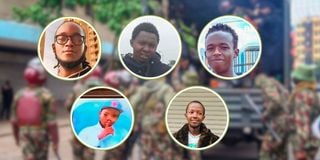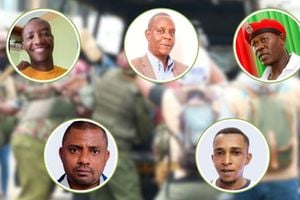
Top bottom (from left): Rex Masai, Ibrahim Wanjiku Kamau and Evans Kiratu. Bottom row (left): Kenneth Njeru Mwangi and Erickson Mutisya.
Two months have passed since the anti-tax protests erupted across the country, leaving a trail of devastation and heartbreak.
For many, the protests have faded into memory, but for the families of those who lost their lives, the pain remains sharp and unrelenting.
The chaos has subsided, and the world seems to have moved on, but for the families of those who were lost, time has become a relentless tormentor.
June 25 became a nightmare for Kenyans—a day that began with hope and ended in bloodshed. What the youth believed would be a peaceful demonstration turned into a massacre, as police unleashed bullets and tear gas on the young men and women who had taken to the streets to protest after MPs passed the controversial Finance Bill 2024.
In the streets, bodies fell, and blood flowed as the hopes of a generation were met with brutality. Many protesters were left with serious bullet wounds, and their cries for justice were answered with violence.
For the families, they are left alone with their grief, a grief that consumes them like a slow-burning fire, an ache that torments the heart, a sorrow that refuses to heal. And perhaps most agonising of all is the taste of injustice, the feeling that their cries for justice have faded into the same silence that their loved
On July 25, The Kenya National Commission on Human Rights (KNCHR) said the number of lives lost in the previous five weeks of protests rose to 60, nine days after the commission had put the figure at 50.
In multiple interviews, the Sunday Nation spoke to the families of the victims, who shared the heart-wrenching ordeal of searching through countless hospitals, clinging to a fragile hope that their loved ones might still be alive. Now, these families bear their grief alongside 60 others, their hearts heavy with an unbearable burden.
Edith Wanjiku Kamau is grappling with an unimaginable loss—the death of her 19-year-old son, Ibrahim Kamau Wanjiku, who was fatally shot on June 25. That day marked the abrupt end of a life filled with promise and the beginning of relentless heartache that has left Edith reeling in grief.
“I was waiting for him to come home, as he always did, to share a meal. But he never came. I tried calling him, and when his friend answered, my heart sank.
“They had been separated when the police started shooting. Ibrahim was my second-born. Talking about him in the past tense feels like I’m betraying him.
“He was such a good person—so ambitious, so hard-working. He rode a motorcycle to make a living, always pushing forward. He was my baby, respectful and quiet, never one to get caught up in trouble,” she said.
The search she began on June 26 ended in heartbreak.
“On Wednesday, I woke up determined to find him. I went from Kenyatta Hospital to Mbagathi, and finally to the City Mortuary. And there he was—my baby, lying there lifeless. I couldn’t believe it—it was my son. He was just a baby,” she said.
Two months have passed, and Edith is still waiting for justice.
“Where is the justice in this country? My lawyer took me to IPOA, and I gave my statement, but nothing has happened. The police keep calling me to give statements—why can’t they just go to IPOA? I’m afraid of them because my son died at their hands.”
“I don’t want money. I want the person who shot my son to be held accountable. I want him arrested, and sentenced. I want his family to feel the same pain I feel. My son loved leather jackets, and every time I see one, I still think it’s him. We still talk about him because it’s so hard to accept that he’s really gone,” she said.
Rex Masai and his father, Chrispine Odawa, didn’t talk often, but when they did, their conversations were filled with warmth, making up for the silence between them.
Rex was a quiet, joyful young man, living a life away from the public eye, content with his simplicity. At just 29, with dreams still on the horizon, he was working at a casino while waiting for his career as a surveyor to take off. His father, now heartbroken, remembers him as hard-working and full of potential.
“It will take a long time to accept he’s gone, my son was incredibly hard-working. Like so many others, he faced the challenges of unemployment, but he didn’t give up. He applied for a job at a casino and poured his heart into it. He was my firstborn, my friend—I even called him ‘bro.’ How do you move on from losing your child? I don’t know if I ever will,” said Mr Odawa.
The week before Rex died, they hadn’t spoken—a common occurrence that suddenly felt ominous. His father recalled a strange feeling that overcame him, a sign that something was wrong. It wasn’t until the news of Rex’s death that the feeling made sense.
“I had a feeling that something was terribly wrong. I felt it. But I ignored that feeling. I just never thought that my son would pass away. Being Shot.” he said.
“Now, there’s only silence, I don’t know how I’ll heal; this pain feels like it will never fade. I looked at my phone, hoping to see his call, but he was taken away from us—a child with dreams. Even speaking of him still brings me to tears,” his father said, his voice trembling.
He was the first casualty of the police brutality meted out to protesters.
The family received an outpouring of support, but the grief is only deepening. “I appreciate all the support. But I don’t know if we’ll ever see justice. I leave it all to God,” he said.
In another case, the dawn of June 26, 2024, was not just another day for Joseph Mwangi Mweru. It was the beginning of a nightmare that would forever alter the fabric of his life.
The morning sun, which had always brought the promise of a new day, now cast long shadows of despair over his home. It was the day he found out that his beloved son, Kenneth Njeru Mwangi, 20 had been shot during the protests that had gripped Nairobi on June 25.
“My child was just with his friends when they came back without him, I knew something was wrong, but I never imagined it was this bad.” Joseph’s voice trembles as he recounts the events of that day.
The next hours blurred into one agonising moment after another. From the frantic search at Kenyatta National Hospital to the cold, indifferent halls of Central Police Station, Joseph clung to a shred of hope. But when he was directed to the City Mortuary, his worst fears were confirmed.
“That’s where I found my boy, lying there cold,” he says, his voice cracking with a pain that words cannot fully capture. “My firstborn, gone.” He said
Kenneth had been warned by his family not to go to work that day. The protests were intensifying, and the streets were no longer safe. But like many young men his age, he felt invincible, caught between the need to make a living and the pull of his peers.
“He ended up going with his friends to the protests, I didn’t know that he had gone completely,”
The aftermath of Kenneth’s death has been nothing short of devastating for the Mweru family. His mother, unable to cope with the shock and grief, has been placed on medication.
“His mother since that day developed high blood pressure, and she’s now on medication because of all this stress. Kenneth was the one helping us… and now he’s gone. He was his mother’s child, she is still affected, stuck on medicine and I don’t have money, I work in Jua Kali,” he said.
“With his first salary, I had to buy a coffin for his body, It’s so sad...he didn’t even live to enjoy his hard work. I took him up to high school, watched him grow, and now...now I’ve buried him.”
The grief-stricken father now seeks justice for his son. “I want justice for my child,” he says with a quiet determination. “No parent should have to go through this.”
Karobia Kiratu received devastating news through social media that would forever change his life. His 21-year-old son, Evans Kiratu, had tragically died after being struck by a teargas canister during a protest in Nairobi.
“I found out about my son on social media. He was a good man. Evans was always trying to find work. He worked hard, trained as a plumber, and did some design work on the side. He was passionate, just like me, but he chose a different path in life,” he said.
“We had spoken prior, and he told me he was coming to Nairobi. I didn’t hear from him the next day. Maybe he thought it wasn’t a big deal, but I was scared because I hadn’t heard from my son. This was the second protest where people had died under suspicious circumstances. I got worried but was very hopeful,” he said.
The nightmare began to unfold when a Good Samaritan discovered Evans lying on the streets, fighting for his life.
“A good Samaritan took him to the hospital. Chris went back on Friday to check on my son. Sadly, he was no longer with us by then. Chris tried to reach out to his mother, but his voice was faint and unclear. So, his mother did not believe him,” he said.
Johnson Mutisya was at home in Machakos when he received a call that would shatter his world. A friend, hesitant and filled with sorrow, told him something had happened and that he would come over to break the news. Unease crept in as Johnson sensed something was terribly wrong.
Desperate for answers, he turned to social media, only to be confronted with the unimaginable: his 26-year-old son, Erickson Mutisya, was gone.
“He was supposed to send me money for medication that evening, a simple, everyday act of support. Instead, his lifeless body appeared on screens across the country. I’ve been affected so much. He was everything to me in every way,” Johnson shares, his voice heavy with grief.











